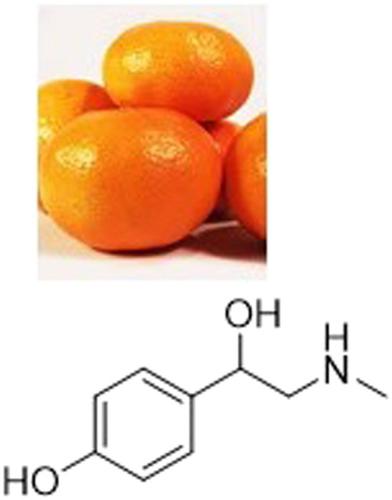当前位置:
X-MOL 学术
›
Drug Test. Anal.
›
论文详情
Our official English website, www.x-mol.net, welcomes your feedback! (Note: you will need to create a separate account there.)
Analysis of bitter orange dietary supplements for natural and synthetic phenethylamines by LC-MS/MS.
Drug Testing and Analysis ( IF 2.9 ) Pub Date : 2020-06-28 , DOI: 10.1002/dta.2871 Rahul S Pawar 1 , Satyanarayanaraju Sagi 1 , Dmitry Leontyev 1
Drug Testing and Analysis ( IF 2.9 ) Pub Date : 2020-06-28 , DOI: 10.1002/dta.2871 Rahul S Pawar 1 , Satyanarayanaraju Sagi 1 , Dmitry Leontyev 1
Affiliation

|
Citrus aurantium, commonly known as bitter orange, is a popular dietary supplement ingredient sold worldwide. Bitter orange supplements are sold primarily as weight management and sports performance products and have gained popularity after Ephedra products were banned from the US market. Supplements containing synephrine are reported to exhibit adverse cardiovascular effects especially in the presence of caffeine. In this study, an LC–MS/MS method was established to quantify five natural amines (synephrine, octopamine, tyramine, N‐methyltyramine, and hordenine) and four synthetic phenethylamines (phenylephrine, methylsynephrine, etilefrine, and isopropyloctopamine) in dietary supplements sold in the US. The method was validated and found to have acceptable performance to accurately measure analytes in complex botanical products. The average recoveries from a blank matrix were 88–125% with an RSD of 0.5–7.0%. Fifty‐nine products labeled to contain bitter orange peel, extract, or its amines were purchased and their amine content was measured. Several products were found to contain higher amounts of amines than that expected from a typical bitter orange extract. Of the 23 products that made label claims for synephrine, only 5 products (22%) were within 80–120% of labeled synephrine content. The presence of synthetic amines, methylsynephrine (up to 240 mg/daily serving), and isopropyloctopamine (up to 76 mg/daily serving), whose effects in humans are not known, were detected in six products and one product, respectively. While the use of methylsynephrine and isopropyloctopamine are not permitted in dietary supplements, hordenine, N‐methyltyramine, and octopamine are currently listed on the FDA's Dietary Supplement Ingredient Advisory List.
中文翻译:

通过 LC-MS/MS 分析苦橙膳食补充剂中的天然和合成苯乙胺。
Citrus aurantium,俗称苦橙,是一种广受欢迎的膳食补充剂成分,畅销全球。苦橙补充剂主要作为体重管理和运动性能产品出售,并在麻黄产品被禁止进入美国市场后受到欢迎。据报道,含有辛弗林的补充剂会对心血管产生不利影响,尤其是在咖啡因存在的情况下。在本研究中,建立了一种 LC-MS/MS 方法来量化五种天然胺(辛弗林、章鱼胺、酪胺、N‐甲基酪胺和大麦碱)和四种合成苯乙胺(去氧肾上腺素、甲基辛弗林、依替夫林和异丙基章鱼胺)在美国销售的膳食补充剂中。该方法经过验证并发现其具有可接受的性能,可以准确测量复杂植物产品中的分析物。空白基质的平均回收率为 88-125%,RSD 为 0.5-7.0%。购买了 59 种标记为含有苦橙皮、提取物或其胺的产品,并测量了它们的胺含量。发现几种产品的胺含量高于典型苦橙提取物的预期含量。在对辛弗林进行标签声明的 23 种产品中,只有 5 种产品 (22%) 的含量在标记的辛弗林含量的 80-120% 之间。合成胺、甲基辛弗林(高达 240 毫克/每日份量)的存在,和异丙基章鱼胺(高达 76 毫克/每日份量),其对人体的影响尚不清楚,分别在六种产品和一种产品中检测到。虽然不允许在膳食补充剂中使用甲基辛弗林和异丙基章鱼胺,但大麦碱、N-甲基酪胺和章鱼胺目前被列入 FDA 的膳食补充剂成分咨询清单。
更新日期:2020-06-28
中文翻译:

通过 LC-MS/MS 分析苦橙膳食补充剂中的天然和合成苯乙胺。
Citrus aurantium,俗称苦橙,是一种广受欢迎的膳食补充剂成分,畅销全球。苦橙补充剂主要作为体重管理和运动性能产品出售,并在麻黄产品被禁止进入美国市场后受到欢迎。据报道,含有辛弗林的补充剂会对心血管产生不利影响,尤其是在咖啡因存在的情况下。在本研究中,建立了一种 LC-MS/MS 方法来量化五种天然胺(辛弗林、章鱼胺、酪胺、N‐甲基酪胺和大麦碱)和四种合成苯乙胺(去氧肾上腺素、甲基辛弗林、依替夫林和异丙基章鱼胺)在美国销售的膳食补充剂中。该方法经过验证并发现其具有可接受的性能,可以准确测量复杂植物产品中的分析物。空白基质的平均回收率为 88-125%,RSD 为 0.5-7.0%。购买了 59 种标记为含有苦橙皮、提取物或其胺的产品,并测量了它们的胺含量。发现几种产品的胺含量高于典型苦橙提取物的预期含量。在对辛弗林进行标签声明的 23 种产品中,只有 5 种产品 (22%) 的含量在标记的辛弗林含量的 80-120% 之间。合成胺、甲基辛弗林(高达 240 毫克/每日份量)的存在,和异丙基章鱼胺(高达 76 毫克/每日份量),其对人体的影响尚不清楚,分别在六种产品和一种产品中检测到。虽然不允许在膳食补充剂中使用甲基辛弗林和异丙基章鱼胺,但大麦碱、N-甲基酪胺和章鱼胺目前被列入 FDA 的膳食补充剂成分咨询清单。

























 京公网安备 11010802027423号
京公网安备 11010802027423号